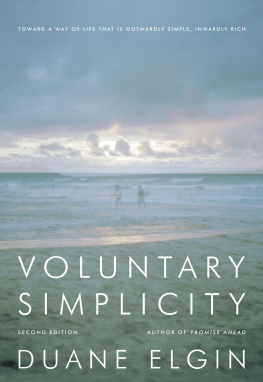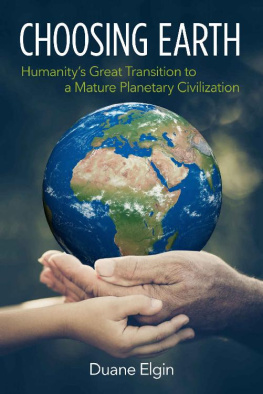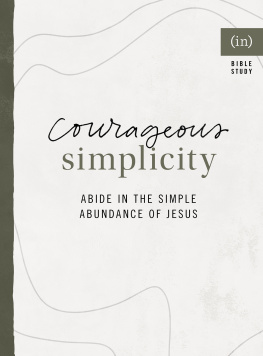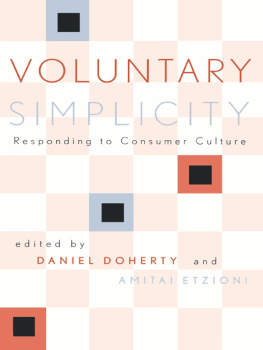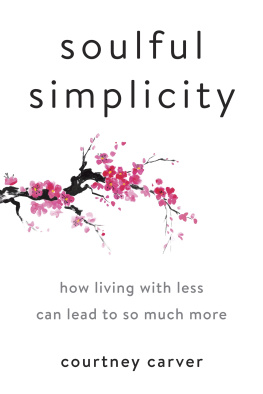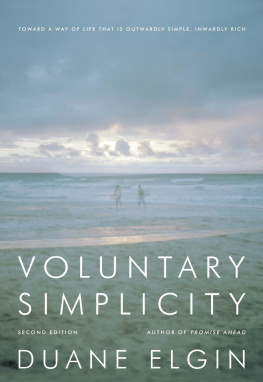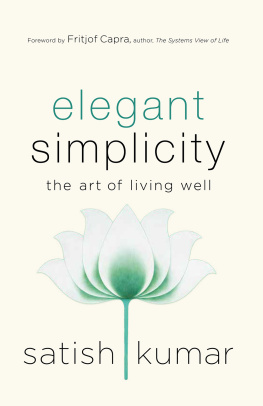There are innumerable persons who have helped me along the wayeither in the learning that led to the writing of this book or in the writing process itself. I want to acknowledge particularly: my father for his integrity, generosity, and example of patient craftsmanship; my mother for her curiosity, compassion, and zest for life; Daniel Berrigan for teaching me that the way of love does not turn from life; Donald Michael for his enthusiasm for learning with an open mind and open heart; Arnold Mitchell for his collaboration in early research on simpler living as well as his helpful critiques of the early drafts of this book; Annie Folger for her loving support; Ram Dass for his patient reading of early versions of this book and for writing the insightful foreword; Frances Vaughan for her encouragement and enthusiasm for this work; Roger Walsh for his friendship, support, and discerning reading of numerous versions of this manuscript; and Ronda Dav for her skilled computer analysis of the survey results. A huge thanks to all of the people who responded to the grassroots survey for bringing a richly human dimension to this work. Finally, I want to acknowledge the assistance of other persons who, in various ways, have helped this work along its path to completion: Barry Bartlett, John Brockman, Joe Dominguez, Andrew Dutter, Coleen LeDrew Elgin, Sally Furgeson, Paula Hendrick, Bertil Ilhage, Kathryn Reeder, Vicki Robin, Mary Schoonmaker, Peter Schwartz, Peter Teige, Mary Thomas, John White, and Monica Wood.
to the Second Revised Edition
EDGAR MITCHELL
I n 1971, during my return from the moon aboard the Apollo 14 command module, I looked out the window at the space, stars, and planet from which Id come and suddenly experienced the universe as intelligent, loving, and harmonious. I also realized that the Earth is a gem in the cosmos, a place to revere and care for. We are here not by accident, but on a journey of awakening that is as magnificent as the universe that holds us. We have a profound responsibility to care for the Earth, which is our craft on a voyage of both outer and inner discovery. The visionary scientist-philosopher Buckminster Fuller, at the beginning of space flight, pointed out: We are the crew of space-ship Earth, but we are a crew in mutiny. How can you run a spacecraft with a mutinous crew? Duane Elgins book helps to quell this mutiny against nature, as he compassionately confronts the difficult challenge of making a transition to a new world in which we are living in balance with the Earth.
I met Duane in 1973 when he was working as a senior social scientist doing futures studies at the California think tank SRI International. His primary work was to look ahead a generation or more and explore a range of alternative futures for government agencies such as the National Science Foundation and the Presidents Science Adviser. Duane was also working at SRI as one of four principal subjects in experiments being funded by NASA to explore our intuitive or psychic potentials. This was an area of keen interest to me, as I had conducted such experiments in space while on my lunar mission and I was in the process of founding the Institute of Noetic Sciences (www.noetic.org) to explore the nature of consciousness. Duane and I discovered mutual interests not only in exploring untapped human potentials but also in our concern for humanitys future. For more than thirty years, he has explored the frontiers of human knowledge to understand the nature of the universe and the human journey within it. Our paths have crossed a number of times, and I have grown to appreciate him and his work as a scholar, visionary, and activist. Duanes love for the Earth and the human journey is apparent.
I believe this book is important because we are overconsuming the planet and we are not sustaining our spacecraft Earth for future generations. Within a generation we can devastate the ecological foundations of the planet, or we can learn to live and consume within the boundaries of what the Earth can support. The days have now passed when we can ignore the impact of our individual decisions and lifestyles upon the collective. Personal responsibility for the greater good must become the mark of an informed and conscious people . It is vital to our future as a human family that we each look beyond our personal lifestyles and consider the well-being of the whole. Unrestricted consumption and growth in all areas of life must be reexamined and subjected to critical thought. We must act quickly to bring our human desire for material abundance under control. Otherwise, we risk wounding the biosphere so profoundly that the foundation for a healthy and robust human future is forever diminished. I pray that our descendants will forgive us these errors as we struggle to bring our Earth back into balance.
Duanes book offers a realistic pathway for a hopeful future. To me, a world of sophisticated simplicity sounds interesting, collaborative, artistic, and creative. Instead of regress, Duane is calling for a new kind of progress that integrates the inner and outer aspects of our lives. This is an important call for Earth-friendly ways of living that are grounded in practical actions by caring individuals who understand the critical challenges facing humanity. Duane calls on us to take personal responsibility for the well-being of the Earth and for cocreating a future of soaring promise. I hope this book becomes a catalyst for the vitally important conversation that our world must have if we are to voluntarily bring our personal and collective lives into harmonious balance with the Earth.
EDGAR MITCHELL, Sc.D.,
Ph.D.; astronaut, Apollo 14;
founder and chairman,
Institute of Noetic Sciences
2009
to the First Edition (1981)
RAM DASS
A s one who has spent a great deal of time in the East, Ive had the chance to view intimately a way of life that, in its simplicity, is very different from the style of living to which we in the West are accustomed. Even as I write these words, I look out over a gentle valley in the Kumoan Hills at the base of the Himalayas. A river flows through the valley, forming now and again man-made tributaries that irrigate the fertile fields. These fields surround the fifty or so thatched or tin-roofed houses and extend in increasingly narrow terraces up the surrounding hillsides.
In several of these fields I watch village men standing on their wooden plows goading on their slow-moving water buffalo, who pull the plows, provide the mens families with milk, and help carry their burdens. And amid the green of the hills, in brightly colored saris and nose rings, women cut the high grasses to feed the buffalo and gather the firewood that, along with the dried dung from the buffalo, will provide the fire to cook the grains harvested from the fields and to warm the houses against the winter cold and dry them during the monsoons. A huge haystack passes along the path, seemingly self-propelled, in that the woman on whose head it rests is entirely lost from view.
At a point along the stream there is laughter and talk and the continuous slapping of wet cloth against the rock as the family laundry gets done. And everywhere there are children and dogs, each contributing his or her sound to the voice of the village.
Everywhere there is color: red chili peppers drying on the roofs and saris drying by the river, small green and yellow and blue birds darting among the fruit trees, butterflies and bees tasting their way from one brightly colored flower to another.
I have walked for some five miles from the nearest town to reach this valley. The footpath I have taken is the only means of exit from this village. Along the way I meet farmers carrying squash, burros bearing firewood or supplies, women with brass pots on their heads, schoolchildren, young men dressed in city clothes. In all of these people I find a quiet, shy dignity, a sense of belonging, a depth of connectedness to these ancient hills.

